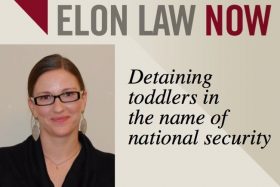Elon Law Professor Heather Scavone examines U.S. justifications for family detention of immigrant women and children, spotlighting a lack of legal representation for these families, as part the “Elon Law Now” series of faculty analysis and commentary about current legal issues.

“In 2014, the U.S. became the subject of scrutiny by human rights advocates here and across the globe for its controversial practice of detaining immigrant women and children who arrive in the U.S. without authorization, usually by crossing the U.S-Mexico border.
“This practice of ‘Family Detention,’ allows the government to hold women and their children in privately run detention facilities while they await deportation proceedings. Most of the women and children currently held in these facilities have fled to the US from the Central American nations of Honduras, El Salvador and Guatemala, where many have suffered from horrendous sexual and domestic violence. Their detention has been justified by the U.S. government as a mechanism for ensuring that its deportation priorities are focused on, ‘threats to national security, border security, and public safety.’[1] Under domestic and international law, the U.S. is obligated to afford individuals who articulate a credible fear of persecution in their home country with an opportunity to apply for the protection of asylum. One major concern for the detained women and children is that they do not have access to attorneys to represent them with their asylum claims. Whereas a detained criminal defendant enjoys the 6th amendment right to court-appointed counsel, this Constitutional protection has not been construed to apply in immigration proceedings. Thus, in many cases these detained mothers and children cannot access attorneys to represent them with their claims.
“It is important to note that the detained women and children in these facilities are not criminal defendants. Immigration detention is a form of civil detention that accompanies immigration deportation proceedings. Individuals in immigration detention are not, therefore being prosecuted for criminal offenses. Rather, they are involuntarily confined until they are deported or until they prove to the federal immigration courts that they are eligible for some type of relief from deportation. In 2003 the Supreme Court held that immigration detention is a lawful form of civil confinement as long as it is not used to punish. For the hundreds of women and children who are currently being held in immigration detention facilities in Karnes and Dilley, Texas, however, recent evidence suggests that Homeland Security’s intent is to punish them, making the situation more akin to criminal incarceration than to civil confinement.
“The administration has stated that it wants to focus its resources on ‘felons, not families. Criminals, not children,’ a claim which appears to be in direct contrast with the practice of family detention.[2] While the national security benefit of prioritizing the deportation of convicted felons over other unauthorized migrants seems clear, it’s hard to understand how mothers and infants threaten national security. However the affidavits of two high-level DHS employees recently revealed that civil detention of mothers and toddlers is being deliberately employed by the federal government to serve as a deterrent to others who might consider crossing the border illegally. As such, the detention of these mothers and children is punitive in nature since its purpose is to deter others from crossing into the U.S. unlawfully by creating lengthy jail sentence for those who enter without permission.
“Serious concerns have been raised by civil liberties organizations about due process protections for the detainees and in particular, their inability to access legal representation while in detention. With precisely this concern in mind, six Elon Law students have plans to travel to Karnes, Texas, during spring break to provide pro bono legal representation to these women and children. Elon faculty member Marty Rosenbluth and I will travel with the students, all of whom are women, to undertake this project with them.”
In October 2014, Elon Law alumnae Allison Lukanich L’12 and Natalie Teague L’09 were part of a four-person team of North Carolina attorneys to travel to Artesia, New Mexico to provide pro bono legal services to some of the 400-plus women and children held in detention there. Their efforts were explored by WUNC’s The State of Things in November.
More information about Elon Law Professor Heather Scavone is available here.
More information about the Humanitarian Immigration Law Clinic at Elon Law is available here.
[1] Memorandum from Jeh Johnson, Secretary of Homeland Security, on November 20, 2014
[2] November 20, 2014, speech by President Obama


